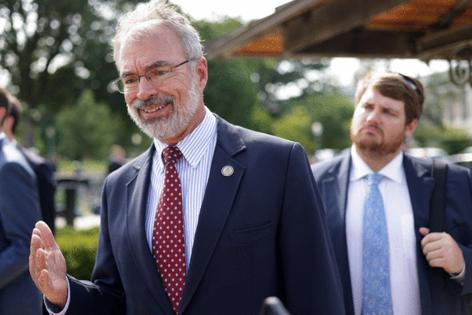Social Security bill bottled up after election night maneuver
Published in News & Features
WASHINGTON — Members of the ultraconservative House Freedom Caucus orchestrated an unusual play on the House floor during a rare election night, 5 p.m. pro forma session that resulted in killing, at least for now, a broadly popular bill that was set to hit the floor as soon as next week.
Reps. Garret Graves, R-La., and Abigail Spanberger, D-Va., had successfully rounded up the 218 signatures needed for a discharge petition to bypass GOP leaders and bring up bipartisan legislation that would repeal two long-standing provisions docking Social Security benefits for certain retirees. They were set to make their move as soon as Tuesday night by triggering a two-day clock to bring to the floor the special rule for immediate consideration of the bill.
With 330 co-sponsors, including now-Speaker Mike Johnson, R-La., who was one of the first to affix his name early in the 118th Congress, passage of the measure was all but guaranteed. GOP leaders were mulling simply bringing it to the floor under suspension of the rules, which skips a rule vote but requires two-thirds of members present and voting to pass.
Then the Freedom Caucus, which opposes the measure’s $196 billion cost over a decade, intervened.
What happened: Freedom Caucus Chairman Andy Harris, R-Md., a more or less local member from the Eastern Shore, presided over the pro forma session, which lasted all of seven minutes.
During the brief session he recognized outgoing Rep. Bob Good, R-Va. — the former Freedom Caucus chair who lost his primary — for a unanimous consent request. Good’s request to lay the Social Security bill on the table was agreed to by unanimous consent, with no one else in the chamber to object.
The effect of laying the bill on the table in this context, under House rules, has the same effect as defeating a bill on the floor; it is dead for the time being. Since the discharge petition was actually filed on the rule for consideration, not the bill itself, the rule could still be called up for a vote under discharge procedures, which if adopted would remove the bill from the table and allow a vote.
Alternatively, a brand new, identical bill could simply be introduced — as early as this Friday’s pro forma session — and that measure put up for a vote under suspension of the rules as soon as next week.
So it’s not a permanent hold on the Social Security bill by any stretch, but the manner in which the maneuver occurred is striking.
Harris’ move to recognize Good goes against the “Speaker’s announced policies” in exercising authorities under House rules, which stipulate that such UC requests can only be made after receiving assurances that the majority and minority leadership of both the House and the relevant committees have no objection.
In fact, before Harris recognized Good, House Parliamentarian Jason Smith can be heard on the microphone saying: “The chair will not entertain the gentleman’s request. The chair cannot entertain the gentleman’s request.”
Harris and the parliamentarian appear to have had words after the House adjourned, according to congressional procedure expert Kacper Surdy — known as “ringwiss” on the social platform X — who posted an account of the exchange to his X account.
Hefty price tag
Even if the bill ends up passing the House, the price tag and limited time remaining in the session make it an uphill climb to clear the Senate, although it has more than enough backers in that chamber to overcome a filibuster.
The legislation would repeal the “windfall elimination provision” and “government pension offset,” which reduce Social Security benefits for those who spent portions of their careers in state and local government or other positions where their earnings weren’t subject to Social Security taxes.
The Congressional Budget Office estimated the bill would cost $196 billion over a decade and move up the date of the Social Security trust funds’ exhaustion by six months. The bill’s backers argue six months isn’t that significant considering Congress was already going to have to intervene sometime around 2034, and that even the advertised price tag is misleading.
Rather than taxpayer dollars being wasted, the cost represents money “taken out of the hard-earned monthly Social Security checks of retired law enforcement officers, teachers, nurses, and bus drivers over the next 10 years,” according to the National Association of Police Organizations, which has been lobbying for the measure.
Graves, the lead GOP sponsor, is leaving Congress after redistricting resulted in his district becoming one that heavily favors Democrats. Spanberger is running for Virginia governor.
In a statement after the floor action Tuesday, Graves dismissed the Freedom Caucus move as a meaningless stunt. “Now that this new precedent has been created, I plan to seek UC to send every American a pony,” he said.
_____
©2024 CQ-Roll Call, Inc., All Rights Reserved. Visit cqrollcall.com. Distributed by Tribune Content Agency, LLC.







Comments